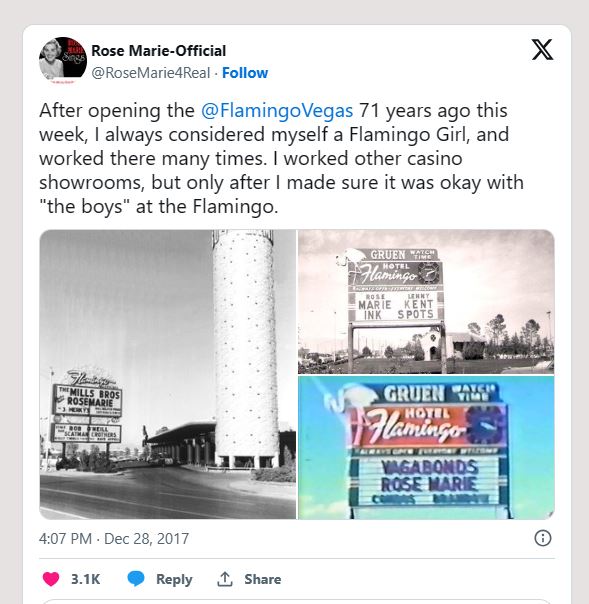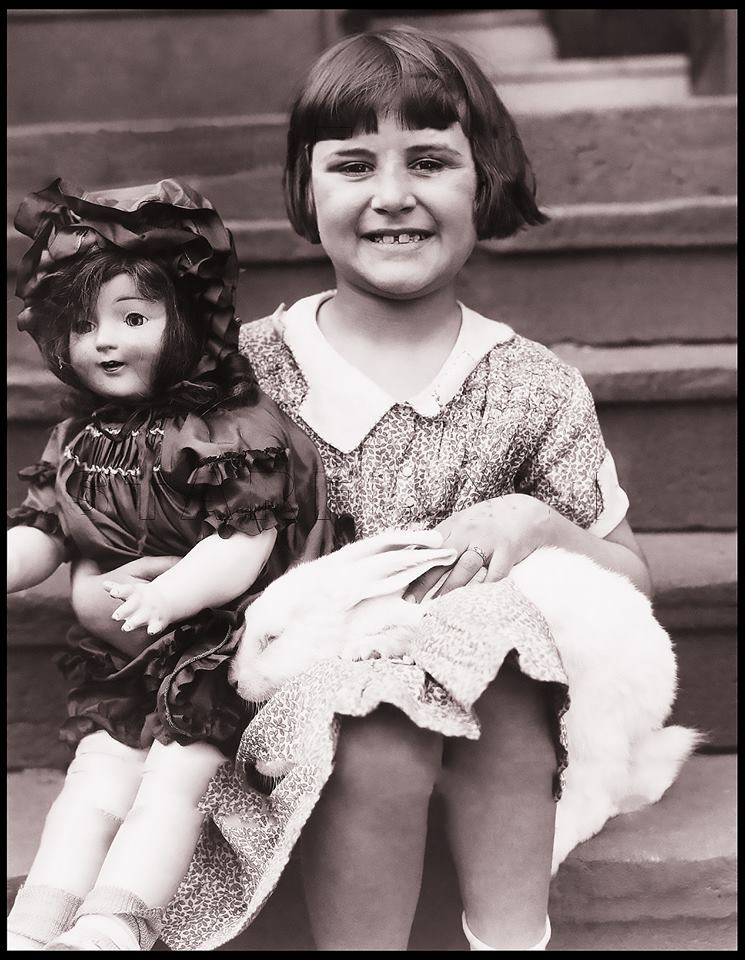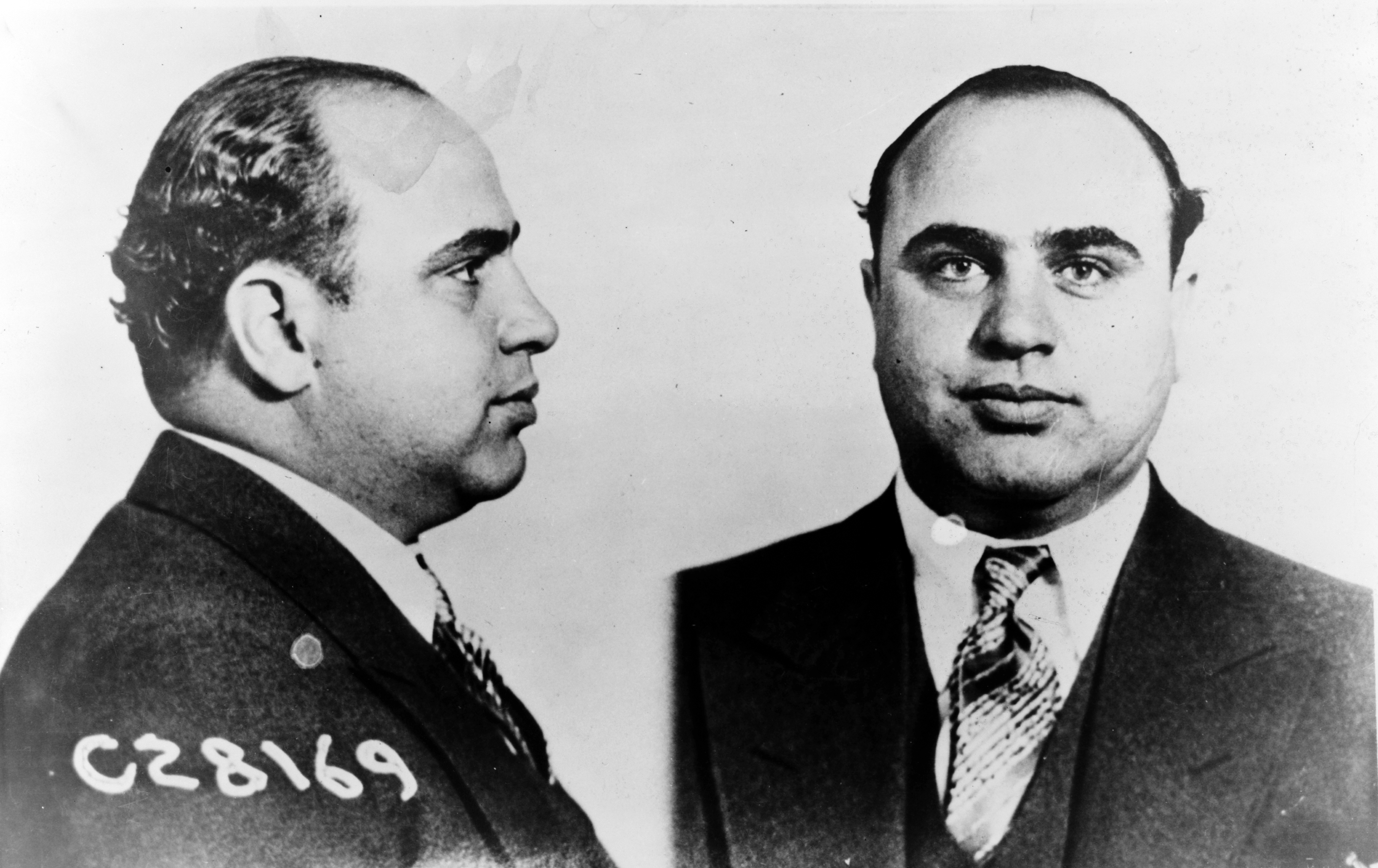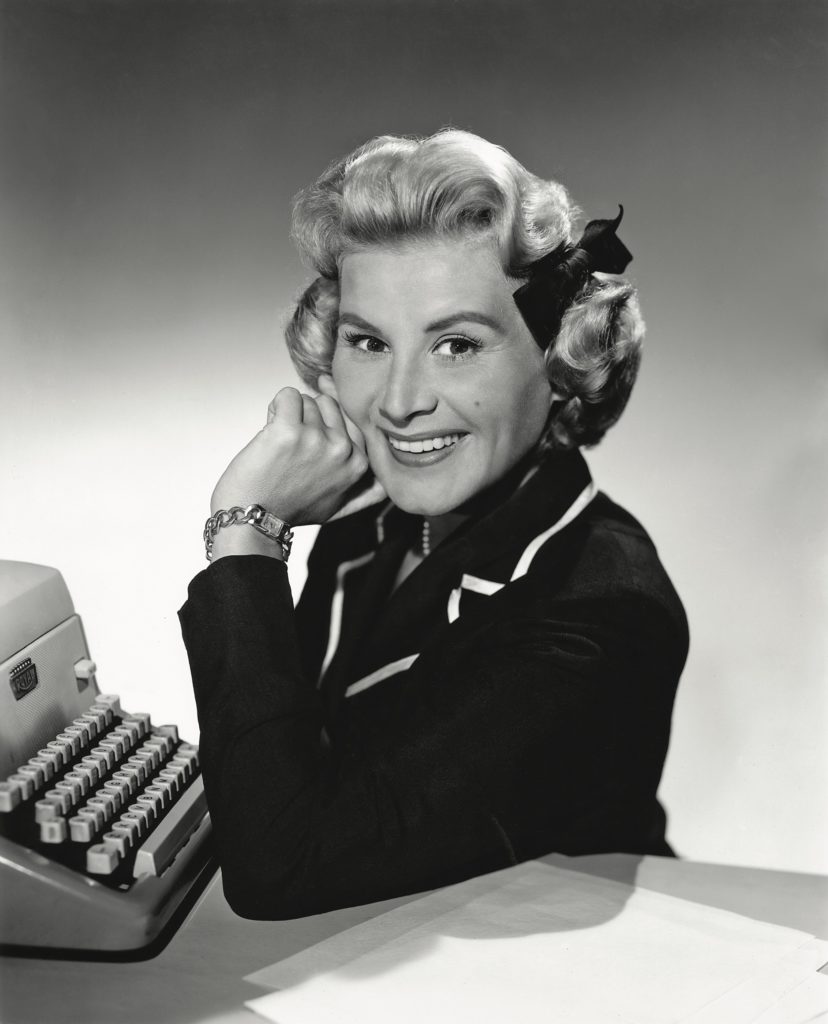ROSE MARIE: AT HOME WITH "UNCLE AL"
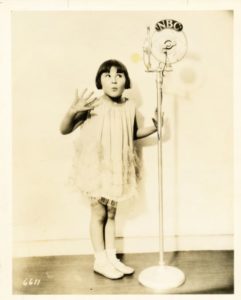
A CHILD SINGING STAR, ROSE MARIE MET THE CHICAGO CRIME BOSS AL CAPONE IN 1931
Even hardened gangsters have a soft spot for adorable little girls. Rose Marie found that to be true with the notorious Al Capone, whom she remembers as “Uncle Al.”
Most people remember Rose Marie as the spunky “Sally Rogers” on TV’s The Dick Van Dyke Show in the 1960s, but she was already a pro at the age of five. Rose Marie, aka “Baby Rose Marie,” was a radio star for NBC, and a much-sought-after vaudeville entertainer. She worked on stage with legends such as Rudy Vallee, Dick Powell, George Burns, Gracie Allen and Milton Berle. From late 1929 to 1934, she was at the height of her fame as a child star, performing nonstop around the country.
Her father, Frank Mazetta, was always with her. He took 100 percent of her earnings as he had two families he needed Rose Marie to support. The first was his wife and two children, and the other was the woman he had a relationship with that resulted in two more children, one of them being Rose Marie. Frank never did marry Rose Marie’s mother.
But that’s a different story. On to Chicago.
Vaudeville circuit
Rose Marie, now 93 years old, chuckled as she recounted her story. “I was working at the Palace Theatre in Chicago.” The gorgeously ornate Palace Theatre (now called the Cadillac Palace Theatre), opened in Chicago in 1926 primarily to be “the” theater for the renowned vaudeville Orpheum Circuit. Rose Marie was one of the last vaudeville acts to perform at the Palace Theatre in 1931 before it was converted into a movie theater. Rose Marie met Al Capone a few months before he was convicted of tax evasion and sentenced to 11 years in federal prison.
She described her meeting with the man her father had once worked for. “When we got to the Palace Theatre, the doorman said to me, ‘There’s a man who wants to see your father.’ My father and I walked out into the alley, and there was a big man standing by a limousine. He said to my father, ‘Hello, ‘Happy.’’ I asked my father, ‘What did he say? What did he call you?’ And my father said, ‘Never mind.’ And the big man said, ‘The boys want to meet the kid. They love her, and they want to meet her. I’ll have the limo come pick her up tomorrow.”
Rose Marie listened as her father and the big man juggled calendars. “My father said, ‘She does four shows a day. You’ll have to run her back and forth.’ The man said, ‘Don’t worry, we’ll make it. She’ll be back for the shows. I’ll pick her up at 4 p.m.’ My father countered, ‘But her show is at 3 p.m. You better make it 4:30 p m.’ ‘Okay, fine,’ the big man said. Then the man got into the back of the limousine, and it drove away.”
“As my father and I walked down the alley to the theater, I said to my father, ‘Why did he call you Happy?’ He said, ‘That’s my name, Happy Hank. That’s what they call me.’ I said, ‘Who gave you that name?’ He said, ‘I’ll tell you later.’” Rose Marie said her father never told her the reason for his odd name. She still wonders to this day.
The doorman, who had watched everything, solved for her the mystery of who the “big man” was. “We got to the backstage door, and the doorman said, ‘Do you know who that was?’ I said, ‘No, I don’t know.’ He said, ‘That’s Al Capone.’ I said, ‘Oh my God. They’re going to pick me up in an envelope!’” She advised the doorman that he — Mr. Capone — would be coming around tomorrow to pick her up.
At home with Capone
Even at eight years old, Rose Marie knew who Al Capone was. His name was always in the papers, and Chicago was synonymous with Capone, blood and murder, in that order. And he wanted to see her? Understandably, she was a little nervous.
Even at eight years old, Rose Marie knew who Al Capone was.
“The next day came. At 4:30 p.m., the doorman said, ‘Mr. Capone’s driver is here.’ We went out in the alley and we got into the black limousine. We drove up to this house. It was a brown house, and I remember it had a lot of steps to get to the front door.”
Rose Marie paused for a moment, lost in thoughts, before she quietly said, “I can see it, that house. I can see it in front of me.” After a second of silence, she continued. “We went up the steps, into the house, and walked into a room. It had a long table in it. I’ve never seen such a long table. There were 24 guys sitting around it. Everyone had a place. I didn’t know what to say. I looked at them, and I looked at my father, and then I watched as Al Capone came over to me and my father. He said, ‘Hi, Happy.’
“Then Al Capone smiled, picked me up, and he said, ‘Hello, little lady.’ He said, ‘We all love you. The boys want to meet you.’ All of the boys stood up, and they waved to me, and I waved back. It was wild. It was crazy. I didn’t realize this until a month later what was happening.
“He held me in his arms, and he gave me a dinner ring. At that time, they were very popular. This dinner ring had three diamonds in it. He said, ‘This is for you, honey.’ He said, ‘Good luck with it. I want you to wear it.’ I said, ‘Thank you.’ He said, ‘You call me Uncle Al.’ I said, ‘Sure, Uncle Al. You got it.”
Rose Marie laughed and explained how at that moment Al Capone’s wife, Mae Capone, came into the room and started to walk toward them. She remembered turning to her father and asking, ‘What do I call her, Aunt Mae?’ He said, ‘Just be quiet. Shut up,’ you know.’”
Capone found humor in the conversation between Rose Marie and her father, and he felt a connection to the plucky girl. “While he was still holding me in his arms, he said, ‘The guys love you, and we’re going to take care of you. Don’t worry about anything. If you need anything, you want anything, you let us know. We’ll take care of you.’ He told my father, ‘From now on, don’t worry about anything. She’ll be all right. We’ll watch her. We’ll take care of her.’ My father said, ‘Thank you.’ I said, ‘Thank you.’ He was so nice. And then he said, as he smiled, ‘Don’t forget, call me Uncle Al!’ I said, ‘Uncle Al.’”
He put Rose Marie down, and she and her father had to rush back to the Palace Theatre to do her next show. Rose Marie still has the ring that Uncle Al gave her.
Rose Marie still has the ring that Uncle Al gave her.
Even though “Uncle Al” was sent to prison a few months later on October 17, 1931, his promise that he made to Rose Marie and her father stayed true. The “boys” made sure of it. “Wherever I went, one of the ‘boys’ would come to see me,” she explained. “Even when I was an adult performer, someone was always there.”
Working the Copa
She reminisced about working at the Copacabana in New York — Frank Costello’s club.
“Frank would come over, sit at my table and ask, ‘Do you want anything to eat? You want anything to drink? Are you being treated all right? Is there anything I can do?’ I was asked the same questions all the time.”
She recalled another interesting night at the Copa. “I was having dinner, and the manager came up to me and said, ‘There’s a Mr. Fisher in the lounge who wants to see you.’ I said, ‘I don’t know a Mr. Fisher.’ The manager left, but came back a minute later and said, ‘Mr. Fisher wants to see you in the lounge.’ I said again, ‘I don’t know any Mr. Fisher.’ He said, ‘Yes, you do.’ I said, ‘Oh, all right.’
“I went out there, and it was Joe Fischetti.” Joseph “Joe Fish” Fischetti was a first cousin to Al Capone, and he was intimately involved in the Chicago Outfit. “I said, ‘Joe, why didn’t you tell me you changed your name?”’ He said, ‘It’s Joe Fisher.’ I said, ‘Oh, okay, fine.’” She laughed at how naïve she was at the time.
Rose Marie continued to laugh in her trademark gravelly voice. “Joe asked, ‘Do you want anything? You need anything? They treating you right? You wanna eat?’ I said, ’I’m fine.’ He said, ‘I just want to see that you’re all right.’”
I just want to see that you’re all right.
Joe then asked her, “Where are you going next?’ I said, ‘I’m not working.’ He said, ‘You’re going to Reno or Tahoe. These are some of the other places that we have clubs.’ I said, “Whatever you say!’”
“And believe me, they kept me working all year, because every place I went, somebody owned it, you know. And I was looked after with kid gloves. It was absolutely wonderful. They’d always asked, ‘Where are you working next?’ God forbid I’d say, ‘I don’t know,’ because they’d say, ‘You’ll be working in Tahoe, Reno or a country club in Kentucky. I was busy working. And then I went back to the Flamingo. I played the Flamingo four to five times a year.”
Rose Marie knew who these “boys” were, and she knew their reputations. Her thoughts of them? “I loved every one of them. They were wonderful to me. I was treated like a queen. They were better than my father. All of them. Including Uncle Al.”
This is the second of a two-part series on Rose Marie. Previous: Rose Marie performed at opening of Bugsy Siegel’s Flamingo Hotel in Las Vegas.
Update: Rose Marie died on December 28, 2017, at age 94. She recently had been busy on Twitter, writing many remembrances of her almost 90-year acting and singing career that included singing for Presidents Calvin Coolidge and Herbert Hoover as a child. She also wrote about the new documentary on her life, Wait for Your Laugh, that was released in selected theaters in late November and picked by The New Yorker magazine as one of the best movies of 2017.
Two days before her death, she tweeted about the 71st anniversary of the opening of the Flamingo Hotel in Las Vegas on December 26, 1946, where she headlined with comedian Jimmy Durante. It turned out be her final tweet.
“After opening the @FlamingoVegas 71 years ago this week, I always considered myself a Flamingo Girl, and worked there many times,” she wrote. “I worked other casino showrooms, but only after I made sure it was okay with ‘the boys’ at the Flamingo.”
